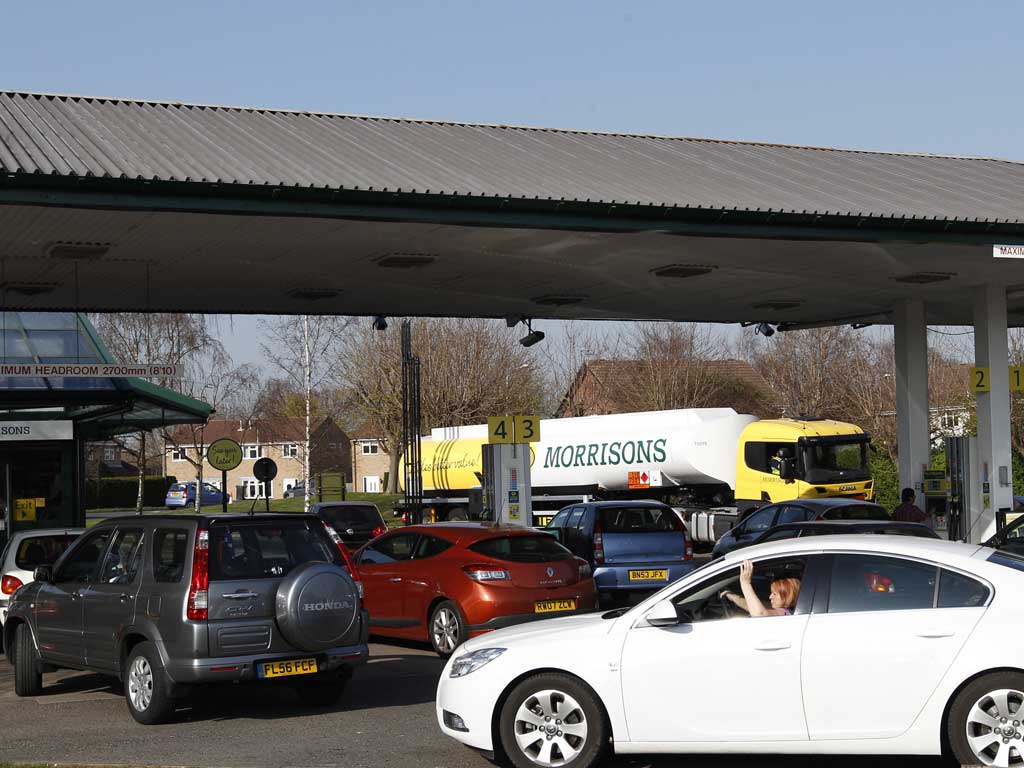Tanker drivers' strike talks to begin next week as panic buying continues to spread
Police urge public not to panic buy fuel amid reports of congestion at petrol stations around the country and plans for talks next week

Your support helps us to tell the story
From reproductive rights to climate change to Big Tech, The Independent is on the ground when the story is developing. Whether it's investigating the financials of Elon Musk's pro-Trump PAC or producing our latest documentary, 'The A Word', which shines a light on the American women fighting for reproductive rights, we know how important it is to parse out the facts from the messaging.
At such a critical moment in US history, we need reporters on the ground. Your donation allows us to keep sending journalists to speak to both sides of the story.
The Independent is trusted by Americans across the entire political spectrum. And unlike many other quality news outlets, we choose not to lock Americans out of our reporting and analysis with paywalls. We believe quality journalism should be available to everyone, paid for by those who can afford it.
Your support makes all the difference.Despite increasingly feverish panic buying of fuel and an escalating row over government advice, no further talks will be held to resolve the tanker drivers' dispute until Monday it was announced this afternoon.
Acas officials said today they have been in contact with the seven distribution companies involved in the dispute as well as the union Unite.
An Acas spokesman said:
“We are now in the process of receiving more detailed briefings from the parties on the various issues underpinning the dispute. This will enable us to determine more clearly the form substantive talks should take to provide the best opportunity for a negotiated settlement.
”We should conclude that process by Monday and would then hope substantive discussions would follow shortly afterwards.“
The announcement followed a day of panic buying across the country, which caused the closure of some petrol stations as demand for fuel from worried motorists soared.
It was estimated by the AA today that the revenue from the spike in fuel sales could result in an extra £32m in extra excise duty.
Across the country motorists queued for petrol.
In Dorset police called for petrol stations to temporarily close where there is queueing because of panic buying.
And in Hampshire police were forced to issue a statement saying there were no fuel shortages in the county, a rumour they claimed was being spread on the internet.
The Petrol Retailers Association, which represents around 5,500 garages, reported a sharp rise in petrol sales of 81% with sales of diesel also up by 43%
There was also a sharp rise in the sale of jerry cans as worried motorists took the advice of Cabinet minister Francis Maude to stockpile fuel.
The rise in prices comes against the backdrop of confused advice from the government on how motorists should prepare for the - as yet unconfirmed - tanker drivers' strike.
Labour leader Ed Miliband called on the Prime Minister to apologise after the government issued conflicting messages to motorists.
“The prime minister is presiding over a shambles on petrol. The country is paying the price for the incompetent way he is governing,” he said.
Brian Madderson, chairman of the Petrol Federation, today gave his response to the government advice to stockpile petrol, telling Radio 4’s The World at One,
”This government appears intent on creating a crisis out of a serious concern.“
A spokesman for the Petrol Retailers Association, which represents around 5,500 outlets, also attacked the Government advice to keep vehicles filled up, and Minister Francis Maude’s suggestion that the public should keep jerry cans in their garages saying,
”This is exactly what we didn't want - people panic buying. Deliveries are still being made to garages and we are advising people to continue with their normal buying habits.“
As the union concerned, Unite, would have to give seven days notice of any strikes - industrial action over the Easter period is looking increasingly unlikely.
Some 90% of UK forecourts are supplied by about 2,000 drivers in the Unite union.
The Energy Minister, Ed Davey, today advised motorists to top-up their vehicles with fuel when they are half empty.
Speaking to the BBC Mr Davey said,
"I think our major advice is that people just need to do the sensible thing if they're going into the petrol station, they should get a full tank of petrol, not a half-tank of petrol, and they should top up where necessary."
Join our commenting forum
Join thought-provoking conversations, follow other Independent readers and see their replies
Comments